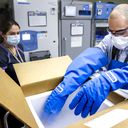As localities improvise to distribute COVID vaccines, an information vacuum emerges

Local health officials are turning to online services like Eventbrite to improvise distribution schemes for the COVID-19 vaccine in the absence of federal support or a national plan.
Why it matters: Millions of lives, along with the country's economic recovery, depend on a speedy and successful rollout of the vaccine. But as people hunt for scarce information about vaccine availability and delivery processes, the lack of coordinated communication risks opening an information vacuum — into which misinformation could easily pour.
Driving the news: In Florida, a number of counties are using events platform Eventbrite, a platform known for selling concert tickets and coordinating happy hours, to schedule COVID-19 vaccine appointments.
- "This is the only option we have right now," Jesi Ray, a communications specialist for Brevard County, Florida, told The Verge.
- Some services like SignUp Genius are pitching their availability for vaccine scheduling, with counties across the country adopting them.
- It's not an ideal approach for some populations, including seniors who aren't internet-savvy, and some have turned to newspaper reporters for help scheduling their appointments.
Be smart: Local governments, already stretched by the crisis and reeling from Congress's delays passing the latest COVID-19 relief bill, often lack the resources necessary to manage vaccine communication and coordination.
- Many have looked for help from both online providers and pharmacies, which tend to have better access to consumer data and are able to deploy information in a quick, personalized manner.
- Once people have gotten the first dose of Pfizer's two-dose vaccine, for example, pharmacies will be key players in helping make sure they take the second dose three weeks later.
- "It is kind of falling on pharmacies," says Chris Haynes, a political science professor at the University of New Haven. "There hasn't been an app developed for federal or state governments to make sure the vaccine rollout was tracked. All of this stuff should've been planned months ago."
The big picture: Historically, the federal government has established systems to help local governments deploy emergency information, like tornado and hurricane warnings that are broadcast on local television, as well as localized text alerts.
- But the government hasn't set up emergency communication systems to convey localized information about the vaccine, forcing citizens to turn to less reliable sources of information online.
- "We're going to have to think through systems that will reach people when they need information that's highly specific — and in this case, time sensitive," says Kathleen Hall Jamieson, director of the Annenberg Public Policy Center at the University of Pennsylvania. "We'll need to institutionalize that structure and keep track of it."
- "The fact that we don't already have it is a real indictment," she told Axios. "We should've thought this through before."
What to watch: A lack of coordinated messaging around the vaccine rollout has left millions of people to search for answers online and via social media, opening space for confusion and misinformation.
- Experts worry that big tech platforms, already reeling from election misinformation problems, are not equipped to help vet and verify vaccine rollout information.
Of note: Almost all of the experts Axios spoke to said that the best way to tackle this problem would be through a massive, federal government-backed awareness campaign educating consumers about the importance of getting a vaccine and directing them to some sort of a federal directory with links to verified local resources.
- Since the U.S. has no centralized database with citizens' addresses and health records, that's likely the fastest thing the federal government can do to support local governments with the rollout at this point.
Our thought bubble: Developing a vaccine was a hard problem, but distributing it shouldn't have been in the same league, and the U.S. had months to prepare a plan.
What's next: The incoming Biden administration is promising a "whole of government response" after Jan. 20, per the Washington Post.